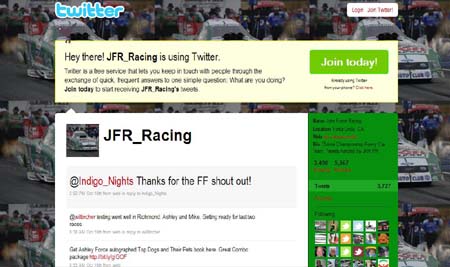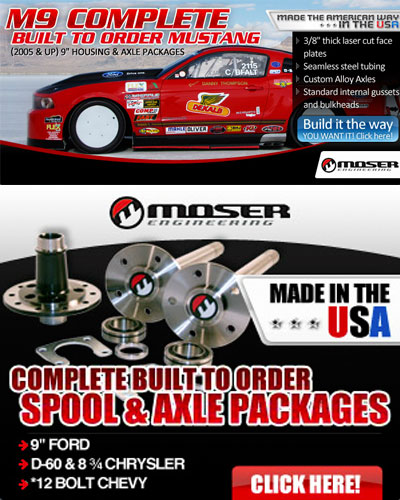WILL SPONSOR DRIVEN TWEETS GET A DRIVER IN TROUBLE?
 Under new Federal Trade Commission guidelines drivers can still climb out of his or her race car spouting of about how their sponsor supported manufacturer product drove the quarter mile or the 1000 foot thanks to the wearing of a uniform that makes it obvious the driver is being paid for his comments.
Under new Federal Trade Commission guidelines drivers can still climb out of his or her race car spouting of about how their sponsor supported manufacturer product drove the quarter mile or the 1000 foot thanks to the wearing of a uniform that makes it obvious the driver is being paid for his comments.What about when the uniform is not so obvious? When the contact between athlete/entertainer/celebrity lacks the face time achieved by television or a personal meeting the rules have changed courtesy of the advent of myspace, facebook, twitter and similar products. Faceless contact has come under close scrutiny lately as the Federal Government attempts to protect the unwitting consumer.
Under new Federal Trade Commission guidelines drivers can still climb out of his or her race car  spouting of about how their sponsor supported manufacturer product drove the quarter mile or the 1000 foot thanks to the wearing of a uniform that makes it obvious the driver is being paid for his comments.
spouting of about how their sponsor supported manufacturer product drove the quarter mile or the 1000 foot thanks to the wearing of a uniform that makes it obvious the driver is being paid for his comments.
What about when the uniform is not so obvious? When the contact between athlete/entertainer/celebrity lacks the face time achieved by television or a personal meeting the rules have changed courtesy of the advent of myspace, facebook, twitter and similar products. Faceless contact has come under close scrutiny lately as the Federal Government attempts to protect the unwitting consumer.
Most of the teams and drivers in NHRA competition have, if at all, adopted a casual use of the new “social interaction” tools which have morphed into important “social media” tools that have become so popular in the past three to five years. A few use them heavily.
While it may be obvious that Ashley Force Hood receives product and financial support from Ford, if she doesn't reveal that support in a “tweet” where she mentions her Ford Mustang there could be trouble. If Tony Schumacher espouses the benefits of joining the ARMY to young men and women on a facebook page or “tweet” his is going to have to reveal the message is a paid promotion for the ARMY.
Those are just two examples of how NHRA drivers could go afoul of the new FTC regulations. However, those examples barely scratch the surface. If a motel provides free rooms to a team over the course of a weekend, any mention of the hotel in “social media” by that organization would have to include a statement revealing the relationship between hotel and team.
“I love being in Indianapolis because the view from my room at the Marriott is just so awesome,” said xyz driver would clearly be afoul of the rules.
“I love being in Indianapolis where the view from my room at the Marriott, which was supplied at no charge in exchange for a decal on my race car, is just so awesome,” said xyz driver would meet the new requirements.
The rules are about controlling endorsements. They are about ensuring the public is aware an individual is making a statement because they truly like a product or service versus a statement made because there is a contract between two parties.
Here are the guidelines as published by the FTC:
FTC Publishes Final Guides Governing Endorsements, Testimonials
Changes Affect Testimonial Advertisements, Bloggers, Celebrity Endorsements
The Federal Trade Commission today (10.5.2009) announced that it has approved final revisions to the guidance it gives to advertisers on how to keep their endorsement and testimonial ads in line with the FTC Act.
The notice incorporates several changes to the FTC’s Guides Concerning the Use of Endorsements and Testimonials in Advertising, which address endorsements by consumers, experts, organizations, and celebrities, as well as the disclosure of important connections between advertisers and endorsers. The Guides were last updated in 1980.
Under the revised Guides, advertisements that feature a consumer and convey his or her experience with a product or service as typical when that is not the case will be required to clearly disclose the results that consumers can generally expect. In contrast to the 1980 version of the Guides – which allowed advertisers to describe unusual results in a testimonial as long as they included a disclaimer such as “results not typical” – the revised Guides no longer contain this safe harbor.
The revised Guides also add new examples to illustrate the long standing principle that “material connections” (sometimes payments or free products) between advertisers and endorsers – connections that consumers would not expect – must be disclosed. These examples address what constitutes an endorsement when the message is conveyed by bloggers or other “word-of-mouth” marketers. The revised Guides specify that while decisions will be reached on a case-by-case basis, the post of a blogger who receives cash or in-kind payment to review a product is considered an endorsement. Thus, bloggers who make an endorsement must disclose the material connections they share with the seller of the product or service.
Likewise, if a company refers in an advertisement to the findings of a research organization that conducted research sponsored by the company, the advertisement must disclose the connection between the advertiser and the research organization. And a paid endorsement – like any other advertisement – is deceptive if it makes false or misleading claims.
Celebrity endorsers also are addressed in the revised Guides. While the 1980 Guides did not explicitly state that endorsers as well as advertisers could be liable under the FTC Act for statements they make in an endorsement, the revised Guides reflect Commission case law and clearly state that both advertisers and endorsers may be liable for false or unsubstantiated claims made in an endorsement – or for failure to disclose material connections between the advertiser and endorsers. The revised Guides also make it clear that celebrities have a duty to disclose their relationships with advertisers when making endorsements outside the context of traditional ads, such as on talk shows or in social media.
The Guides are administrative interpretations of the law intended to help advertisers comply with the Federal Trade Commission Act; they are not binding law themselves. In any law enforcement action challenging the allegedly deceptive use of testimonials or endorsements, the Commission would have the burden of proving that the challenged conduct violates the FTC Act.
The Commission vote approving issuance of the Federal Register notice detailing the changes was 4-0. The notice will be published in the Federal Register shortly, and is available now on the FTC’s Web site as a link to this press release. Copies also are available from the FTC’s Consumer Response Center, Room 130, 600 Pennsylvania Avenue, N.W., Washington, DC 20580.
The Federal Trade Commission works for consumers to prevent fraudulent, deceptive, and unfair business practices and to provide information to help spot, stop, and avoid them. To file a complaint in English or Spanish, visit the FTC’s online Complaint Assistant or call 1-877-FTC-HELP (1-877-382-4357). The FTC enters complaints into Consumer Sentinel, a secure, online database available to more than 1,700 civil and criminal law enforcement agencies in the U.S. and abroad.
The FTC’s Web site provides free information on a variety of consumer topics.
Advertisement



































